Kowloon Motor Bus
The Kowloon Motor Bus Company (1933) Limited (KMB) is a bus company operating franchised services in Hong Kong. It is the largest bus company in Hong Kong by fleet size and number of bus routes. It is a subsidiary of Transport International.
 | |
.jpg.webp) Kowloon Motor Bus facelifted Wright Gemini 3 bodied Volvo B8L in March 2019 | |
| Parent | Transport International |
|---|---|
| Founded | 13 April 1933 |
| Headquarters | Lai Chi Kok |
| Service area | Hong Kong |
| Service type | Bus services |
| Alliance | Long Win Bus |
| Routes | 642 |
| Depots | 4 |
| Fleet | 4073 (Oct 2019) |
| Annual ridership | 990 million (2016) |
| Website | www |
| Kowloon Motor Bus | |||||||||||
|---|---|---|---|---|---|---|---|---|---|---|---|
| Traditional Chinese | 九龍巴士(一九三三)有限公司 | ||||||||||
| Simplified Chinese | 九龙巴士(一九三三)有限公司 | ||||||||||
| |||||||||||
History
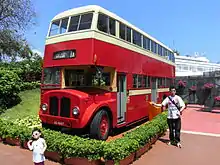
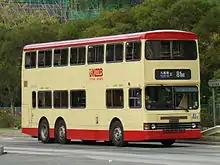
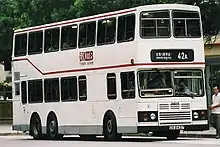
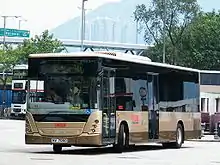
KMB was founded on 13 April 1933 as a result of the reformation of public transport by the Hong Kong Government. Before the reformation, there were several independent bus operators working on both sides of Victoria Harbour including KMB.
The Hong Kong Government enforces the bus franchises in favour of the franchisees, while it prosecutes the operators of unauthorized private bus services and other types of authorized bus service that pick up or drop off passengers in franchised bus parking zones.[1]
The KMB franchise allowed for the operation of public omnibus service on the Kowloon side as well as the New Territories. By 11 June 1933, KMB had a fleet of 106 single-deck buses.[2]
The founding members of KMB were:
- Tang Shiu Kin (鄧肇堅)
- William Louey Sui Tak (雷瑞德)
- Lui Leung (雷亮)
- Tam Woon Tong (譚煥堂)
- Lam Ming Fan (林明勳)
By December 1941, KMB had 140 single-deckers operating on 17 routes. As only a handful of buses survived World War II, some lorries were temporarily converted into buses. By the late 1940s, KMB ridership increased with the huge influx of immigration from China. In 1949, KMB bought 20 Daimler double-deckers from England, becoming the first operator of double-deckers in Hong Kong.[2]
Following the opening of the Cross Harbour Tunnel in 1972, KMB operated a number of cross-harbour routes jointly with China Motor Bus, the sole bus operator on Hong Kong Island. This marked the first time KMB buses running on the island.[2] In the same year, KMB began experimenting with buses operating without a fare collector. All passengers would board from the front door and pay the fare by putting money into the collection box next to the driver.
In 1996, KMB launched an advertising campaign to promote modern image. It is the first bus company advertising in Hong Kong.[3]
On 1 June 1997, KMB formed a subsidiary, Long Win Bus, to provide service on the Lantau Link to the new Hong Kong International Airport and Tung Chung.[4][5] In 1998, KMB extended its business into mainland China with a co-operative joint venture, Dalian Hong Kong Macau Company. In 1999, KMB started to operate some KCR Feeder Bus (now MTR Bus) routes, which are complimentary to passengers of the KCR East Rail and later West Rail (now MTR East Rail line and West Rail line).
In July 2007, KMB commenced operating a 10-year franchise, that has since been renewed until June 2027.[6][7]
Routes
As at October 2019, KMB operated 642 routes in Kowloon and the New Territories, and operates cross-harbour tunnel routes in co-operation with the two other bus operators Citybus and New World First Bus.[8]
Fares
Passengers pay the fare in cash (no change given) or using an Octopus card, a smart card payment system. Discounts apply for Octopus users on specified route interchange combinations. To enable elderly people and eligible persons with disabilities to travel on the general Mass Transit Railway (MTR) lines, franchised buses and ferries are charged concessionary fare of $2 per trip, starting from 2012. The scheme aims to help build a caring and inclusive society by encouraging these groups to participate more in community activities.[9][10]
Fleet
As of October 2019, Kowloon Motor Bus operated a fleet of 4073 buses.[8]
KMB traditionally purchased buses from English manufacturers including AEC, Daimler, Dennis, Guy Motors, Leyland, Metro Cammell Weymann and Seddon, that either were bodied in England or locally.[11][12][13][14]
In 1975, the first air-conditioned bus in Hong Kong was put into service by KMB. Following the testing of double-deck air-conditioned buses Victory and Jubilant in the early 1980s, KMB became the world's first operator of such buses.[15] All purchases after 1995 were for air-conditioned buses. In May 2012, KMB withdrew its last non-air-conditioned buses from service.[16]
In the late 1970s, it began to purchase chassis from European manufacturers MAN, Mercedes-Benz, Scania and Volvo.[17][18]
KMB original liveries were combinations of red and cream. In the early 1990s, a white and grey livery was introduced for air-conditioned buses, followed in 1997 by a champagne livery. In June 2017 a red and silver livery was introduced.[19][20]
Depots
KMB operate four depots in Kowloon and the New Territories.[8] The depot of a bus is identified by the letter K, L, S, or U, and the letter is marked on the bottom left of the driver's windscreen or below windscreen. The assignment scheme is as follows:
- K: Kowloon Bay depot
- L: Lai Chi Kok (Stonecutters Island) depot
- S: Sha Tin (Siu Lek Yuen) depot
- U: Formerly Un Long (Yuen Long) depot, currently Tuen Mun depot
Football team
Kowloon Motor Bus also has a Hong Kong football club, Kowloon Motor Bus Co. It was formed in 1947 and joined Hong Kong First Division League in the 1947/48 season. Nicknamed "Atomic Bus", the team obtained the only two league titles in 1953/54 and 1966/67. The team attained its peak in the 1950s and 1960s when the "South China - Kowloon Motor Bus Co. crash" (南巴大戰) was one of the highlighted rival matches in Hong Kong. In 1970/71, the team faced their first relegation, but was able to stay in the First Division as Jardines quit the league in the following season. However, the team were relegated in 1972/73. It made its last First Division League appearance in 1976/77, but was relegated after only one season. The football team quit the league in 1981 and reformed in 2017.[2]
See also
- 2018 Hong Kong bus accident
- The Bus Uncle – a 2006 incident filmed on a KMB bus that became an internet phenomenon
- Transport in Hong Kong
References
- Lai, Lawrence Wai Chung; Davies, Stephen Nicholas Guy; Cheung, Alvin Polycarp Cho Wing (August 2011). "Government Transport Land-use Planning and Development by Implicit Contract for Franchised Buses and Ferries in Hong Kong, 1933–1972" (PDF). Planning Practice and Research. 26 (4): 435–466. doi:10.1080/02697459.2011.582395. hdl:10722/145931. ISSN 0269-7459.
- Milestones Kowloon Motor Bus
- Finer, Jonathan, “King of the road” Far Eastern Economic Review, Feb 7, 2002, Vol.165 (5), pp.36-40
- About LWB Long Win Bus Company
- Company Overview Transport International Holdings
- Grant of new franchise to Kowloon Motor Bus Company (1933) Limited Government of the Hong Kong Special Administrative Region 28 March 2017
- Hong Kong bus operator Kowloon Motor Bus company granted new 10-year franchise South China Morning Post 28 March 2017
- Annual report for year ended 31 December 2017 Transport International
- "Bus-Bus Interchange System". Kowloon Motor Bus. 2007. Retrieved 6 December 2007.
- "KMB fares cut on day trains reduce prices". The Standard. 2007. Archived from the original on 22 May 2011. Retrieved 6 December 2007.
- Orders & Deliveries Commercial Motor 27 November 1964
- Giant Daimlers for Hong Kong Commercial Motor 18 March 1966
- Twin-steer Big J tractive unit Commercial Motor 9 September 1966
- 100 Seddonn Buses for Hong Kong Commercial Motor 24 May 1957
- Kowloon Coaches Commercial Motor 12 July 1980
- Farewell to KMB Non-Air Conditioned Buses Kowloon Motor Bus 10 May 2012
- Alexander's HK Merc Commercial Motor 12 March 1983
- Ailsa for Kowloon Commercial Motor 17 November 1978
- Red buses coming to a stop near you The Standard 5 May 2017
- KMB's new red and silver buses to greet Hongkongers by end of June South China Morning Post 22 June 2017
Further reading
- Ko, Tim-keung (2013). 80 Years with KMB (1933-2013). Hong Kong: Joint Publishing. ISBN 9789620434907.
External links
| Wikimedia Commons has media related to Kowloon Motor Bus. |
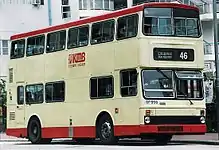
.jpg.webp)